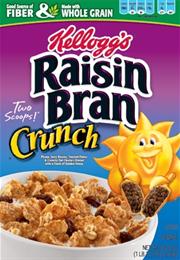
Raisin bran is also a particularly good source of iron, a critical nutrient for preventing iron deficiency anemia ( 11). Fortified cereals are an easy and effective way to increase micronutrient intake ( 8, 9).įurthermore, cereals fortified with folic acid, which is the synthetic form of the B vitamin folate, have helped reduce the incidence of neural tube defects in the United States ( 10). This is beneficial because many people in the United States don’t consume enough iron, calcium, or vitamins A, C, D, and E in their diet. Many of these micronutrients are added through fortification, a process in which vitamins and minerals that aren’t naturally present in a food item are added to the final product to make it more nutritious. Good source of micronutrientsĪ 1-cup (60-gram) serving of raisin bran is a good source of a wide variety of essential vitamins and minerals ( 1, 2, 3). Feelings of fullness can also help prevent overeating, which is a benefit if you’re looking to lose weight or prevent unwanted weight gain ( 6).Īdequate fiber intake may also help reduce your risk of heart disease, type 2 diabetes, and other chronic conditions ( 7).

RAISIN BRAN CRUNCH SERVING SIZE FULL
It promotes bowel regularity and has protective effects against colon cancer ( 5).įiber helps you feel full for longer and may prevent dramatic drops in blood sugar between meals. Getting enough fiber is important for digestive health. However, surveys have found that most people in the United States only get around half of that amount in a typical day ( 4).Ī single serving of raisin bran cereal can meet approximately one-sixth of those needs, which primarily comes from the wheat and bran ingredients. The minimum recommended daily fiber intake for most people is around 30 grams. SUMMARYĭifferent brands of raisin bran have similar macronutrient profiles but can vary substantially in their added vitamin and mineral contents.Īlthough there’s not much research on the health benefits of eating raisin bran cereal specifically, studies have shown that certain nutrients in the cereal may have benefits. However, the added vitamin and mineral content can vary substantially, especially when it comes to calcium, iron, folate, and zinc.

As you can see, the macronutrient - protein, fat, carbs - compositions and calorie contents of various brands of raisin bran are similar.


 0 kommentar(er)
0 kommentar(er)
